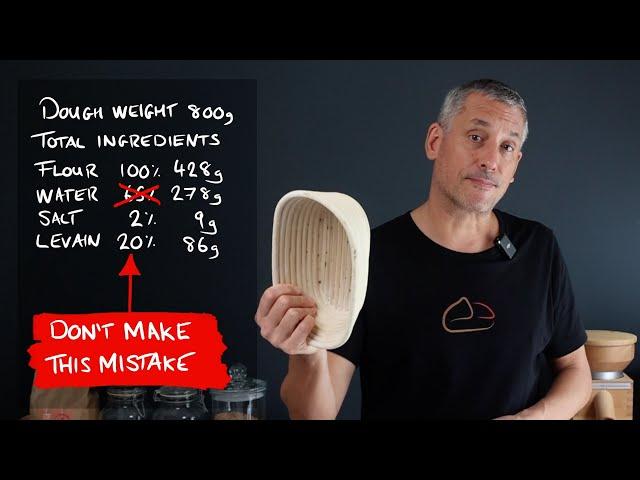
This doesn't work when calculating baker’s percentages for sourdough
Комментарии:

Complex 😮. I need to listen a few more times 😮😐👍🏼
Ответить
I use an app called Homebaker to create my bread recipes and calculate baker's percentages and hydration. It doesn't have the feature to calculate ingredients based on desired dough weight, but overall it's been really practical.
Ответить
Omg, after watching I have realized the reason I failed many times because I didn’t take into account average hydration between levain and main dough 😂 I used to add 75% straight to dough and add starter, so the hydration goes up above 80% , oh gosh😂
Ответить
An absolutely perfect video to go along with the beginner's calculator you so graciously shared. Thank you Phil! The bread is im'proving' :-)
Ответить
Agreed and well explain !
We should take in consideration all the components including starter but must of the recipes do not include it as the final percentages of starter is VERY small. In your example 20 % levain is high

Great video
Ответить
Fantastic, easy to understand and will clear up a lot of confusion for beginner and intermediate bakers. watch the whole vid.
Ответить
I have a basic recipe that I tend to use regardless of any inclusions that may be added. The one thing that might vary is the hydration so the H20 changes depending on my mood. So here is my basic recipe and it produces a fantastic crust and crumb. 300g AP or BF, 75g of any whole grain flour like spelt, 120g starter, 2 teaspoons of kosher salt which is ~10g, and anywhere from 250 - 270 g of H20. It seems that no matter of variations it always work out great. Crunchy crust, very open crumb, big oven spring. I am no expert but have been making SD for several years. I just keep using the same recipe. I did use your cherry chocolate recipe and it was really terrific.
Ответить
It is very rare that I make any comments but I want to say that I followed the steps to make the bread for beginners and it is the first time I have achieved such a beautiful ear on my bread, I am really grateful!!! I would like to know how to make chocolate bread following the same hydration percentage (65%).
Ответить
Excellent information!! Thank you so much for your amazing explanation! Perfection!
Ответить
Learn to see, to feel and at some point you will no longer bother about percentage or scales...
Ответить
This is a great video. When I started making breads all of this was complicated feeling but I got the hang of it. This video sort of simplifies the things that no one was quite explaining to me correctly.
This is worth watching. Bravo!

I’m learning like a pro.Thank you so much for this very useful info Philip! 🔝😃
Ответить
I have found your videos so helpful would love to get the updated version of Magnus jr the link seems to want to download Magnus 2
Ответить
Great video I've recently got back in to bread making and after a few standard loaves I've gone back down the sourdough rabbit hole.
The first couple of loaves where incredibly wet and I couldn't work out why, until it hit me I'd not accounted for the components of the leven in my bakers math. Today's loaf was so much better, then I saw your video. Great to see it all broken down properly, I can hopefully dial it in more now

Thank you!
Ответить
Forget about Artisan baking. You need a match degree to make sourdough bread. Coming to store near you with the added inflation price😮 label "Mathematics. Sourdough"
Ответить
For those of us who sell their loaves it might be more convenient to consider the weight of the baked bread (as accurate as possible) as the initial reference, then work backwards and calculate the total dough weight and then, finally, individual ingredients weight.
In my experience you lose about 10 to 15% of weight during baking, but that may change depending on various factors. Maybe there is a formula for that, but as of today I've never heard of one.
Of course, if you are selling by fixed weight (i.e. a 500g loaf) you must aim a bit higher so as not to risk selling a loaf lighter than advertised.

What a great video! I love the new format of presentation👍🏻Very sharp Phil! I’m going to start baking again right before Thanksgiving. I’ll let you know how it goes. My starter is still doing great even when I forget to feed it for 2 weeks😆
Thank you for sharing🙂

Great video Philip! This is the formula that got me into sourdough... I tend to use whole wheat and rye in my dough and like my salt at 2.2%...
Any tips on higher or lower hydration for using a soaker/additions? What step to add them at - first or last fold?

I use this spreadsheet on a regular basis for recipe design when adding discard, changing hydration, incorporating inclusions, or adjusting the flour mix. Very helpful to understand the basis of the calculations. Excellent explanation, Phil!! The graphics are outstanding!
Ответить
What does a levain do? I never use it.
Ответить
Very well explained. The math I knew before but your explanation of the Method was very useful, will need to adjust for your insight …. Cheers from Canada
Ответить
Like many others, I want to express my deep gratitude for this incredibly useful tutorial and calculator. I only have an inkling of how much work it took to make that spreadsheet work as flawlessly as it does! The follow-up “how to” video nailed everything together. I’m trying to find a straightforward way to save and print my final calculations. I’m on a Mac and iPhone. The calculator works well on the Mac. Not sure it will work on my iPhone.
Not a problem! It’s an exceptional tool!
🙏🏼

Very well explained video, thanks you! I have fallen into the trap of thinking that adding the levain weight to the flour and water would be the same hydration and made some questionable bread.
Magnus 2.0 is so much better than the first version of your calculator! I used 1.0 and could not work out how to use it correctly, 2.0 is much clearer.

Thx. The only issue I have is the calculation for the levain. In your calculation the 20% is relativ to the 100% of flour, but actually only the ingredients of the levain not the levain itself should be relative to the 100% of the flour. So it’s actually only 10% levain and not 20%. But never mind, every english or american content creator does it that way, except Martin from @kingarthurbakingcompany does it the way I said.
Ответить
Total overall ingredients is very important. What I do is I have spreadsheet designed where I enter weight of levain to be used, it then calculates amount of flour and water which includes starter amount (flour, water) and flour water from levain build), I add those number in overall recipe in spread sheet where flour, water, salt etc, then have levain section for levain breakdown flour, water, total. Then in final dough part on spreadsheet to the list flour with subtraction of levain flour, water with subtraction of water from levain build, then weight of all the other ingredients. I also set up spreadsheet so that when I enter quantity of dough that I would wish to make and then it automatically calculates all the weights. For bakers precent to work properly overall formula must have total flour and total water, Then amount of levain should be in final formula not overall formula.
Ответить
How do you account for the weight of the air when fully proofed. A fully proofed dough is heavier than one that is not proofed at all by up to 15%. You say your baneton holds 800g fully proofed dough but your calculations are for pre-proofed weight.
Ответить
I would love a video dedicated to temperature during BF/CF and it's importance/tips & tricks!
Ответить
Congratulations Philip! I follow your videos with great interest. I am a bit confused about what you define as Starter, that is, I consider the starter as the sum of the starter from the previous day + Water + Flour, with the various ratios (1-1-1 or 1-5-5 etc...) while you see that you divide it only into water and flour...
Could you clarify the difference between: Starter, Levian and sourdough? thanks a lot!

This is what I want to understand better and get a handle on. Another wonderful video. Much appreciated! Thank you. I am hoping to learn more.
Ответить
Thank you for sharing this Phil. 👍🏽👏🏽👏🏽👏🏽I would imagine that keto friendly and gluten free flour would have a different formula considering that psyllium husk (for instance) that’s used as a binder would increase the hydration levels and make the dough more sticky?
Ответить
Is your levain and starter computation for "presentation" purposes only?
Isn't your final hydration level working out to 68%?
I would calculate the levain portion as a total (exclusive of that starter line) then break it down to flour, water quantities being added to total starter to form levain i.e. say 20% total levain to total dough (hydration of levain is not necessarily 100% and starter culture added to levain can be 1, 5, 10, 15% of levain) ...
then calculate the starter portion as a total weight percentage of the levain (the hydration of starter culture being added can then be stated e.g. 100%, to determine starter flour).
Adding back the starter, levain to autolyse dough flours is 100% flour ... the total water for the 3 to total flour is hydration ... then salt ratio to total flour

bro, you can usse recipelator. easy
Ответить
Hi - I love this explanation, and it makes perfect sense to me! Problem is, do others calculate it differently? I'm at a loss to understand the Perfect Loaf's recipes so that I can scale them down-- and I know he's an expert so I'm clearly missing something. For example in his basic loaf, his total flour is 946g, and his leaven is 17.1%, which would come to ~162g levain. And yet the levain he puts in his recipe is 151g (~16%). I cannot seem to reverse engineer any of his recipes, and again I'm sure it's my issue. Can you help me to understand? Thanks!
Ответить
First
Thanks it is a very helpful video
I got a question
Your starter is only water and flour ?

Brilliant, thank you for this video, I'll try it 😊 Although my sourdough is nice (?) , I'd like to get better at controlling hydration and I'm eager to learn new technical tricks. Thank you for this informative video!
Ответить

























